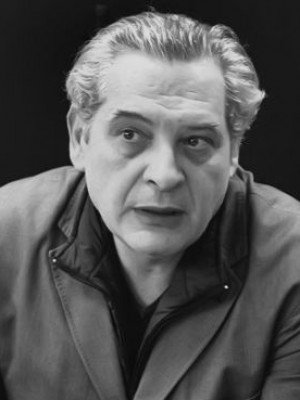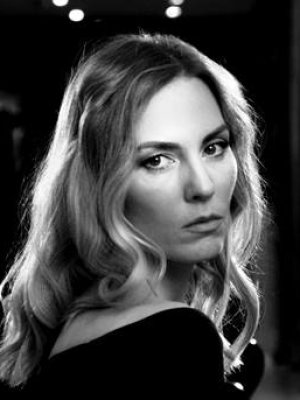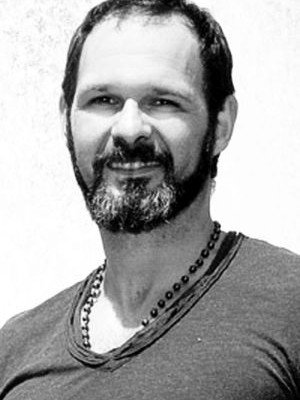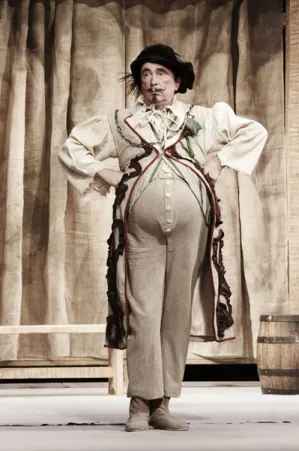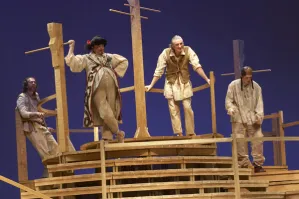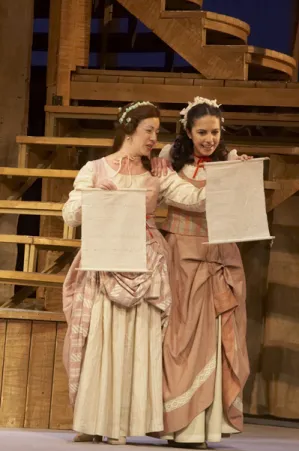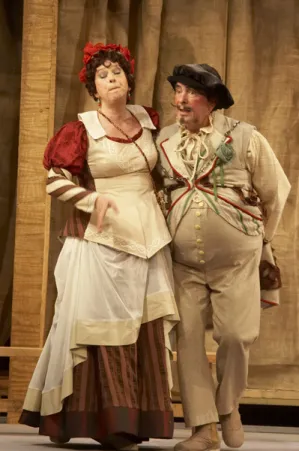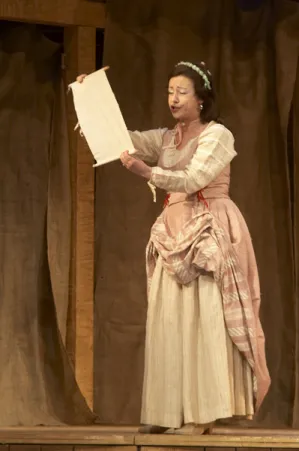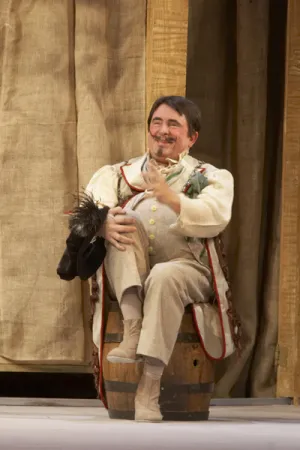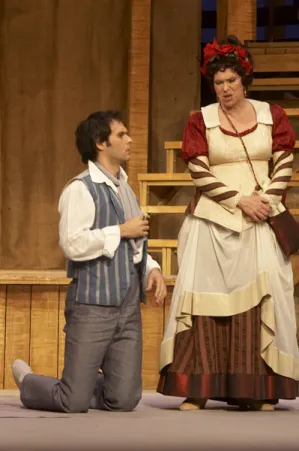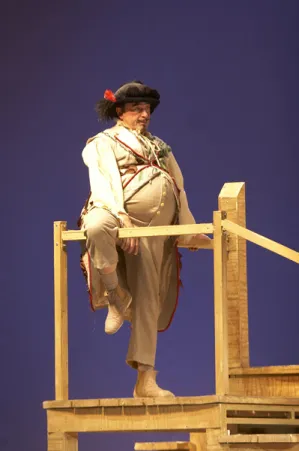The merry wives of Windsor
comedy by William Shakespeare

ABOUT THE PLAY
The Merry Wives of Windsor (c. 1597–1601) is an interesting deviation from the usual Shakespearean romantic comedy in that it is set not in some imagined far-off place like Illyria or Belmont or the forest of Athens but in Windsor, a solidly bourgeois village near Windsor Castle in the heart of England. Uncertain tradition has it that Shakespeare wrote The Merry Wives of Windsor in forteen days and by command of Queen Elizabeth who wanted to see Falstaff in love (for this occasion, Shakespeare resurrected the character of Falstaff, whose death was reported in Henry V). Whether or not this is true, a passage towards the end of the play alluding directy to the ceremonies of the Order of the Garter, Britain’s highest order of chivarly, encourages the belief that the play has direct connection with a specific occasion. In 1597 Geoge Carey, Lord Hunsdon, Lord Chamberlain and patron of Shakespeare’s company, was instolled in Winds as a Knight of the Garter. The Queen was not present at the installation but had attended the Garter Feast at the Palace of Westminster on St George’s Day (23 April). Shakespeare’s play was probably performed on association with the occasion, and may have been written especially for it. Although it contains elements of Plautus' comedies and Italian novelle, The Merry Wives of Windsor does not have a known source. The play differs from Shakespeare's other comedies of this period in that it is set not in an imaginary country but in Windsor and the rural life of Shakespeare's own day. This is essencialy an Elizabethan comedy, the only one that Shakespeare set firmly in England. The play is full of details that would have been familiar to Elizabethan Londoners, and the language is colloquial and up to date. The plot, however, is made up of conventional situations whose ancestry is literary rather than realistic. There are many analogues in medieval and other tales to Shakespeare’s basic plot situations, some in books that he probably or certainly knew. The central story, of Sir John’s unsuccessful attempts to seduce Mistress Page and Mistress Ford, and of Master Ford’s unfounded jealousy, is in the tradition of Italian novella, and may have been suggested by Ser Giovanni Fiorentino’s Il Pecorone (1558). Alongside it Shakespeare places the comical but finally romantic love story of Anne Page, wooed by the folish but rich Abraham Slender and the irascible French Doctor Caius, but won by the young and handsome Fenton. The play contains a higher proportion of prose to verse than any other play by Shakespeare, and the action is often broadly comic: but it ends, after the midnight scene in Windsor Forest during which Sir John is frightned out of his lechery, in forgiveness and love. The play is known to have been acted for James I in 1604, and for Charles I in 1638. It was revived soon after the theatres reopened, in 1660. At first it was not particularly popular, but since 1720 it has consistently pleased audiences. Many artists have ilustrated it, and it forms the basis for a number of operas, including Otto Nicolai’s Die lustigen Weiben von Windsor (1848) and Giuseppe Verdi’s comic masterpiece, Falstaff (1893).
Taken from: Еncyclopedia Britannica 2005, - Stanley Wells, William Shakespeare The Complete Works Clarendon Press Oxford, 1988
 WILLIAM SHAKESPEARE
WILLIAM SHAKESPEARE
William Shakespeare was an English poet and playwright, widely regarded as the greatest writer in the English language and the world's pre-eminent dramatist. He is often called England's national poet and the "Bard of Avon". His surviving works, including some collaborations, consist of about 38 plays, 154 sonnets, two long narrative poems, and several other poems. His plays have been translated into every major living language and are performed more often than those of any other playwright. Shakespeare was born and raised in Stratford-upon-Avon. At the age of 18, he married Anne Hathaway, with whom he had three children: Susanna, and twins Hamnet and Judith. Between 1585 and 1592, he began a successful career in London as an actor, writer, and part owner of a playing company called the Lord Chamberlain's Men, later known as the King's Men. He appears to have retired to Stratford around 1613, where he died three years later. Few records of Shakespeare's private life survive, and there has been considerable speculation about such matters as his physical appearance, sexuality, religious beliefs, and whether the works attributed to him were written by others. Shakespeare produced most of his known work between 1589 and 1613. His early plays were mainly comedies and histories, genres he raised to the peak of sophistication and artistry by the end of the 16th century. He then wrote mainly tragedies until about 1608, including Hamlet, King Lear, and Macbeth, considered some of the finest works in the English language. In his last phase, he wrote tragicomedies, also known as romances, and collaborated with other playwrights. Many of his plays were published in editions of varying quality and accuracy during his lifetime. In 1623, two of his former theatrical colleagues published the First Folio, a collected edition of his dramatic works that included all but two of the plays now recognised as Shakespeare's. Shakespeare was a respected poet and playwright in his own day, but his reputation did not rise to its present heights until the 19th century. The Romantics, in particular, acclaimed Shakespeare's genius, and the Victorians worshipped Shakespeare with a reverence that George Bernard Shaw called "bardolatry". In the 20th century, his work was repeatedly adopted and rediscovered by new movements in scholarship and performance. His plays remain highly popular today and are constantly studied, performed and reinterpreted in diverse cultural and political contexts throughout the world.
 Interview with the Director
Interview with the Director
I NEVER STAGE DULL AND DEPRESSIVE PERFORMANCES
For the very beginning of this talk, we ask our guest from Czech Republic is it his first project for Serbian theatre, and what are his impressions, is a way of work here different from that in other countries where he has been engaged.
I think that theatres are the same everywhere, actors too; the only difference is that in some countries they are well paid for their job. Unfortunately, it is not the case with Serbian actors.
It is Mr Božidar Djurović, Head of the Drama Department who suggested Mr Menzel to stage this comedy of Shakespeare. A respectable guest has not hesitated for a moment; on the contrary he accepted the idea immediately.
I have always worked for the theatre in a way that text is offered to me. I like this piece very much, for it is full of brilliant dramatic situations and amazingly alive characters. Theatre performance should never be dull and depressive. And The Merry Wives of Windsor is just like that – neither dull nor depressive. Of course, it’ll be a lot of humor in it. Humor helps us to forget unpleasant things that are everywhere around us… However, I don’t like to talk about the performance while I am still working on it.”
On our remark that critics, very often define his style, aiming to be understood by “ordinary” audience, as conservative even defeating, Mr Menzel smilingly says that he pays no attention to such opinions.
Such opinions shouldn’t upset anyone. One should pay no attention to them. You must work, in spite of their writings. When you do something in a way that people cannot understand you, it means that you don’t understand the subject you are working on. However, a critic who watches a performance, let’s say for the 80th time, although it is obvious that is not of some success, shall say that it is interesting for him, because it has “something different” which he recognizes as art. Contrary to those opinions, I find that art is to understand what is done. That is a courage and one should realized that.
Menzel emphases that in his theater career he had fortune and pleasure to work on several Shakespeare’s plays, apart from The Merry Wives of Windsor and Hamlet, such as A Midsummer Night’s Dream, The Taming of the Shrew…He admits that Shakespeare is one of his favorite authors.
The present is overwhelmed by the films showing only violence, criminal and murders… Shakespeare, too, was not immune on such phenomena. However, he knew to attract people to theatre, through an interesting plot to which he would always add ethics and compassion for the victim. There is nothing similar in nowadays playwright’s and film producer’s practice. Today everybody favors violence.
Contrary to his theatre career, Mr Menzel has never directed Shakespeare’s play on film. He has never taught of such an idea nor ever he will, he declares.
Shakespeare’s plays can be successfully filmed only by Englishmen, although even they cannot always do the job perfectly.
Further conversation was concentrated on his work on film.
After a year-and-a-half of hard, almost everyday work, Mr Menzel has finished, at the beginning of November last year, his latest film – I Served the King of England made after the famous, same titled novel by Bohumil Hrabal. The plot covers, like in the book, a time from Czech “First Republic” up to the middle of the sixties in Communist Czechoslovakia. The main character is Jan Dite, a waiter, whom we follow from the very beginning when he was “a novice” in some local, provincial hotel, till his release from prison where he was captured because of collaboration with Germans during the Second World War. The film was shown this year at the prestigious International Film Festival in Berlin, where it was awarded by the International Federation of Film Critics – FIPRESCI. Menzel is satisfied with a reaction from audience, especially from Czech’s audience.
Cinemas are quite visited. In the last eight weeks, since it is in repertoire, the film was shown to more than half a million viewers.
More than fifteen years ago Mr Menzel received in Berlin “The Golden Bear” for his film Larks on a String. He didn’t think he could repeat the same success with English King.
I am a realistic man, and I know what great names were there. I am glad I was there. It was a great honor for me to be in such remarkable company.
However, contrary to the judgment of audience, the Czech critics were, this time again, of a different opinion. To quote just some of them: “…We have seen a slightly ironic and precisely acted out film, of a Menzelian refinement and of a Menzelian perfection. We have seen several anthological scenes and sensed true local-rich-bourgeois atmosphere of the First Republic between the two wars – but Hrabalian art of narration in pictures that are all exceptional, his art of narration in fictions, in hyperbolas – unrealistic, but the most poetic that can be imagined, that charm of Hrabalian literature which is its distinctive and essential beauty, value which probably cannot be caught by the film camera, is not shown and captured by the film.”
Ha… They are always of different opinion from the audience’s. Critics are always smarter from those who did the job.
I Served the King of England is the sixth film that Menzel made after Hrabal’s literature…
Hrabal was spiritually very rich, as all the great authors are. Anyone who tries to make something after his literature can only do the job partially. I think that I managed to come very close to Hrabal. Critics who insist that in my films Hrabal could not be seen entirely are right, for nobody can film Hrabal entirely due to all those details that are present in each of his pieces. I am very pleased that the audience was satisfied with all the films I have made after his literature. Also, I am glad that he too was satisfied with the films. Unfortunately, he couldn’t see the last one I Served the King of England, as he tragically lost his life seven years ago.
After a great success of his film Closely Watched Trains, Menzel received very attractive offer to continue his career as a director in the United States. He didn’t accept it and says that he still thinks his decision was the right one.
Yes, still I am sure that it was very clever of me. None of the films I have made later could ever be made in America. America is not so clever.
Our interviewee claims that Oscar, in view of his further affirmation, absolutely was not of any help to him.
That award had no positive impact on my career, even contrary. On my return from America, just after I finished one commercial film, Russian tanks arrived in Prague. Some people from my generation were forbidden to work. I think that Oscar was the main reason that I was struck by the same destiny. Several years I was forbidden to work.
One period of his artistic engagement he spent creating “behind the iron curtain”, in a time when in Czechoslovakia problem of freedom concerning artistic expression still dominated. In spite of all the dangers, he says that in a certain way it was very challenging and inspiring to work in such circumstances.
Everything is different when you are young. In that age, besides the dreams there is always a great motivation. A man has firm reason why he would like to do certain things, and because of that he is forced to find some space to realize his idea. I may say that the communist censure was not so severe as today’s is. It is even more difficult to finance a film today than it was in those times. I honestly admired all these young fellows that are ready to enter into all of that.
With some minor roles, he has built parallel acting career, which is of course inferior to his forty years long career as a film and theatre director.
I am not an actor. That is my hobby. I play in films only because I have friends- directors, who offer me some small roles, better to say the smallest ones.
Interview conducted by Mikojan Bezbradica
Premiere performance
Premiere, March 29, 2007 / Main Stage
Translated by Borivoje Nedić
Director Jiri Menzel*
Dramaturge Molina Udovički Fotez
Set Designer Geroslav Zarić
Costume Designer Marina Vukasović Medenica
Music Arranger Miša Blam
Stage Speech Ljiljana Mrkić Popović
Stage Movement Ferid Karajica
Executive Producer Borislav Balać
Simultaneous Interpreter Danijela Nepejhalova
Organizers Nemanja Konstantinović and Nemanja Ralić
Stage Manager Saša Tanasković
Prompter Gordana Perovski and Danica Stevanović
Assistant Director Veljko Mićunović (student of FDA in Belgrade)
Assistant Interpreter Jasmina Jokić
Premiere cast:
Sir John Falstaff Milan Gutović
Fеntоn, a gentleman Aleksandar Srećković
Shallow, a country justice Nebojša Kundačina
Slender, cousin to Shallow Igor Đorđević
Fоrd, a gentleman dwelling at Windsor Aleksandar Đurica
Page, a gentleman dwelling at Windsor Boris Pingović
Sir Hugh Evans, a Welsh parson Boris Komnenić
Doctor Caius, a French physician Milenko Pavlov
Host of the Garter Inn Branko Jerinić
Bardolph, follower of Falstaff Gojko Baletić
Pistоl, follower of Falstaff Nenad Maričić
Nym, follower of Falstaff Miloš Đorđević
Rоbin, page to Falstaff Danilo Brakočević
Simple, servant to Slender Nenad Stojmenović
Rugby, servant to Doctor Caius Zoran Ćosić
Mistress Fоrd Nataša Ninković
Mistress Page Dušanka Stojanović Glid
Аnne Page, her daughter Jelena Helc / Kalina Kovačević
Mistress Quickly, servant to Doctor Caius Nada Blam
Ragamuffin Nemanja Konstantinović
Servants Milan Šavija, Miloš Dmitrović
Fairies: Aleksandra Kocić, Nikolina Bobar, Maša Miljanić, Milica Nenadić, Mina Radoja, Tijana Drakulić, Jelena Radulović, Marija Mihajlović, Nataša Nenadić, Marija Demirović, Irina Kovačić, Vanja Mijajlović (students of the ballet school “Lujo Davičo”)
Sound Designer Vladimir Petričević
Lighting Designer Lazar Streoski
Make-up Designer Dragoljub Jeremić
Stage Master Dimitrije Radinović
Tone Designer Tihomir Savić
Costumes and set were manufactured in the workshops of The National Theatre in Belgrade.


